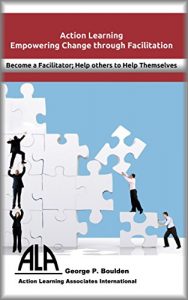The focal point of the Action learning philosophy is Revan’s original idea that mature people learn best ‘with and from each other’. In Action Learning programmes the learning opportunity is provided by a specific task, a project that each participant agrees with their ‘client’. During the project participants meet every few weeks with a facilitator. The role of the facilitator is to ‘manage the learning. In practice this means:
1.Developing understanding of and commitment to the Nature & Process of Change.
2.Encouraging participants to share their project experiences and reflect on the outcomes to identify their learning needs.
3.Working with participants using the KSEB methodology to converted learning needs into ‘learning projects’ thus linking reflection and learning.
4.Providing the environment in which participants are encouraged to achieve both their ‘task and ‘learning’ goals.
5.Creating the conditions in which the set can become self-managing
Note. Whilst this book focuses on the Action Learning approach to Facilitated Learning all activities which have as their core purpose the goal of helping people to change their behaviour are facilitating learning.
1.Developing understanding of and commitment to the Nature & Process of Change.
2.Encouraging participants to share their project experiences and reflect on the outcomes to identify their learning needs.
3.Working with participants using the KSEB methodology to converted learning needs into ‘learning projects’ thus linking reflection and learning.
4.Providing the environment in which participants are encouraged to achieve both their ‘task and ‘learning’ goals.
5.Creating the conditions in which the set can become self-managing
Note. Whilst this book focuses on the Action Learning approach to Facilitated Learning all activities which have as their core purpose the goal of helping people to change their behaviour are facilitating learning.






